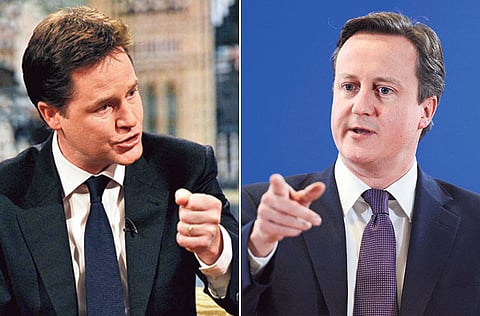Fresh cracks in UK coalition
Deputy attacks Prime Minister's decision to block changes to EU treaty

Dubai: Britain's coalition government was shaken yesterdays after Deputy Prime Minister Nick Clegg hit out against Prime Minister David Cameron's blocking of European Union Treaty changes designed to save the euro.
Liberal Democrat Clegg said that Britain risked becoming an international "pygmy" in comments widely perceived to be an attempt to save face with his largely pro-European party.
Speaking to the BBC, Clegg said he told David Cameron of his concerns during a 4am phone call last Friday, hours before Cameron refused an invitation to join 26 other EU members to approve changes to the bloc treaty.
Cameron told reporters, following the all-night talks in Brussels, that "what was on offer just wasn't good enough for Britain. It's better to allow those countries to do their own thing on their own."
Under threat
The British premier made his decision after he was unable to obtain guarantees that the City of London, the heart of Britain's multi-billion pound financial services industry, would be protected under changes to the EU treaty.
"I said this was bad for Britain. I made it clear that it was untenable for me to welcome it," Clegg said yesterday.
Clegg's comments were interpreted as a sign that Britain's coalition — formed last year after no one party secured enough votes to form a government on its own — was under threat, but one analyst told Gulf News last night that it was too early for a doomsday scenario.
"It's like him saying, ‘I don't like it, but I am going to suck it up'," said Steven Fielding, a professor of Political History at the University of Nottingham. "He's trying to tell the people who follow him that he feels their pain, and hope that that is enough," Fielding said.
He added that if the Liberal Democrats were to leave the coalition now the result would be devastating for them at a general election. "This is what they signed up for in 2010 and all the Liberal Democrats are responsible for that, it wasn't just Nick Clegg."
Writing in an opinion piece in today's Gulf News, (See Page 8) British Foreign Secretary William Hague defended Cameron's decision.
"This government will not accept deals that do not have regard for Britain's justified and reasonable interests," he said.
The coalition has an 84-seat majority in the 650-seat House of Commons. One of its biggest ideological differences involves EU rules and regulations and the degree to which they affect government decisions and London's standing as Europe's top financial market.
— With additional inputs from Bloomberg



